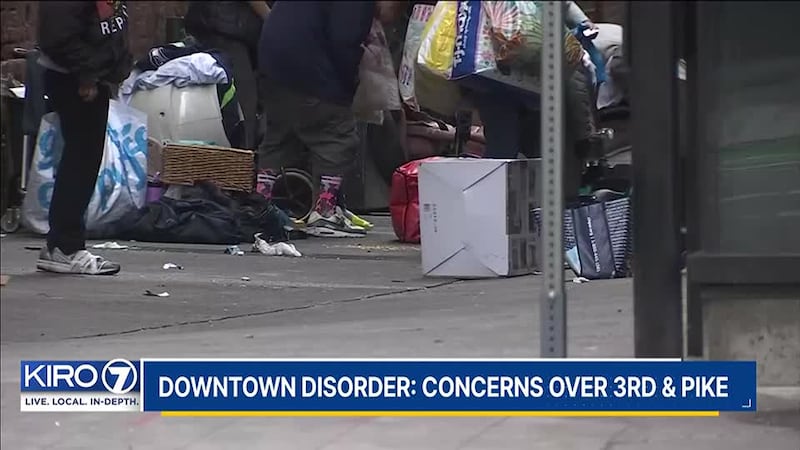The fentanyl crisis continues to plague cities across the United States, including Seattle. For years, both locals and tourists see those struggling with addiction openly use fentanyl in places like 3rd and Pike, even Pine Street. Our crews went to the area Thursday afternoon and saw much of the same. And those who frequent the area tell KIRO7 it’s only gotten worse.
“We have foil all over the ground. They’re either smoking it, blowing it….they don’t care what they’re doing,” one woman told KIRO7.
Some people from out of town also noticed the problem, but would also argue this is a problem everywhere.
“Wherever you go….most cities in the UK, it’s a problem. It’s a sign of endemic poverty,” Richard from Manchester said.
The city of Seattle passed a drug ordinance in September of 2023 to address open air drug use. Mayor Bruce Harrell’s legislation is meant to crack down on drug dealing and trafficking while helping those in need get treatment. His office provided this statement and numbers about the ongoing crisis:
Mayor Harrell’s priority is a dual public health and public safety approach to the fentanyl and synthetic drug epidemic, helping users access treatment and services while holding dealers, traffickers, and those causing the most harm accountable. To that end, the drug ordinance is one of the City’s tools to help people access treatment and to keep sidewalks and neighborhoods safe and welcoming for all residents.
Under the new drug ordinance passed last September, there have been 355 arrests of 325 individuals, and 174 accepted referrals into the LEAD program. 53 people arrested for narcotics were booked for outstanding felony warrants, illegal possession of weapons, and other crimes. Seattle Police have had targeted operations in Little Saigon and downtown, areas where there has been prominent drug use.
The mayor has repeatedly said that success is not measured based on how many people are arrested, but based on how many people receive services and treatment. Our goal is for people to get the support they need to get well, while also reducing the dangerous impacts that public consumption of drugs has on Seattle communities. Some of the health-focused initiatives that Mayor Harrell has advanced include:
- Investing $7 million toward treatment facilities that would provide post-overdose diversion, treatment, medical care, increased casework and provider coordination, and day center services.
- Launching the Seattle Fire Department’s Health 99 post-overdose response team focused on responding to overdoses and connecting those suffering from opioid use disorders to treatment and care.
- Launching a pilot program that allows Seattle Fire paramedics to administer buprenorphine in the field to treat acute opioid withdrawal following a non-fatal overdose.
- Investing nearly $6 million in CoLEAD in the 2024 budget, offering temporary lodging and intensive case management for people involved in the criminal legal system who are also experiencing housing and income instability, mental illness, and/or substance abuse disorders.
- Initiating an innovative contingency management drug abatement program in cooperation with Plymouth Housing. This research-based program is important to address polysubstance use, as there are no FDA-approved medications for stimulant use disorder.
- Reinvesting in We Deliver Care to provide frontline care to those suffering from addiction in the downtown core.
- Creating the CARE Department staffed with behavioral health professionals to respond to 911 calls, connecting people in crisis to services. Yesterday, we announced that the team will be expanding citywide and will add 21 new employees.
We will continue to advance an array of pathways to support recovery for those with substance use issues and seek to create safe, welcoming public spaces for all.
The City Attorney’s Office says Seattle Police has referred 226 cases to their office, but they have declined 112 due to a number of reasons like proof reasons. So far, they have filed 61 of those cases. With all that is being done to address the problem, some people feel it isn’t enough.
“I’m getting to the point where I just want to leave the state and move somewhere else! And I shouldn’t want to leave my home!” One woman said.
KIRO7 also reached out to SPD on enforcement of the ordinance. Once we hear back, we will update this story.
©2024 Cox Media Group








